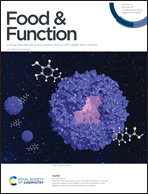Lactobacillus gasseri CKCC1913 mediated modulation of the gut–liver axis alleviated insulin resistance and liver damage induced by type 2 diabetes
Abstract
Type 2 diabetes mellitus (T2DM) is a chronic metabolic disorder characterized by dysregulation of lipid metabolism, insulin resistance, and gut microbiota disorder. Compared to drug interventions, probiotic interventions may have a more enduring effect without producing any side effects. Thus, the potential of probiotics as a therapeutic approach for diabetes and other metabolic disorders has gained increasing attention in recent years. In this study, we evaluated the therapeutic efficacy of Lactobacillus gasseri CKCC1913, a potential probiotic strain, in high-fat diet-induced insulin-resistant diabetes using the C57BL/6J mouse animal model. From the results, L. gasseri CKCC1913 has been shown to increase glucose tolerance, reduce fasting blood glucose levels in diabetic mice, and reduce the expression of pro-inflammatory cytokines, such as TNF-α and IL-6. Besides, L. gasseri CKCC1913 intervention effectively alleviated oxidative stress damage by increasing SOD activity, decreasing MDA levels, reducing insulin resistance, and improving dyslipidemia caused by diabetes. The potential mechanism of L. gasseri CKCC1913 in improving metabolic health and alleviating diabetes involves an increased abundance of beneficial bacteria, such as Parabacteroides merdae, which directly produce short-chain fatty acids that help regulate immune cells and reduce inflammation. SCFAs also enter the bloodstream and promote antioxidant enzyme activity in the liver, protecting against oxidative damage. Additionally, L. gasseri CKCC1913 influences local bacterial metabolism pathways, such as the superpathway of unsaturated fatty acid biosynthesis, leading to an increase in unsaturated fatty acids, increasing high-density lipoprotein cholesterol (HDL-C) levels and improving lipid metabolism and glucose control in diabetic mice. In summary, in this study, L. gasseri CKCC1913 and its potential impact on metabolic health highlight the promising potential of probiotics as a therapeutic approach for diabetes. Future research should focus on identifying the optimal dose and duration, investigating the long-term effects and mechanisms of action, and exploring the potential use of probiotics as an adjunct to other therapies or in preventing metabolic disorders.



 Please wait while we load your content...
Please wait while we load your content...